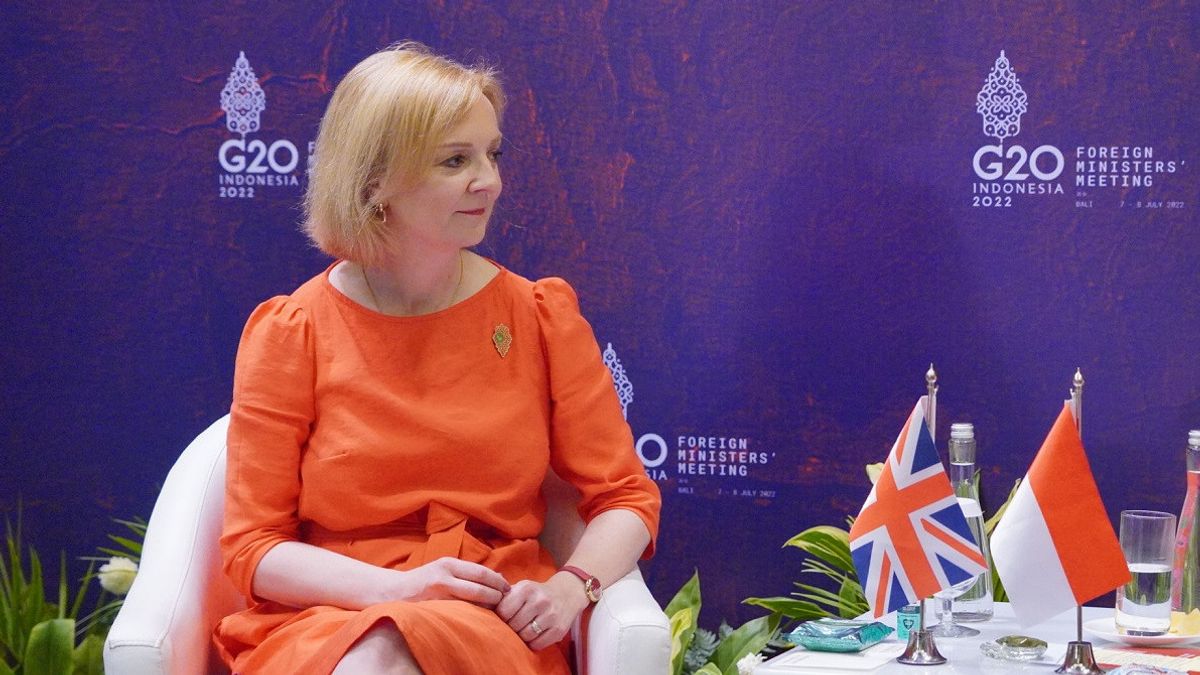JAKARTA - British Prime Minister Liz Truss announced her resignation just six weeks after being sworn in. Not only being prime minister with the shortest term of office, it is time to have an office in 10 Downing Street, London, the official residence and office of the British PM are also shorter than the election process he underwent.
Speaking outside the office door No. 10 Downing Street, Truss accepted she was unable to fulfill the promise she made when she ran for Conservative leader, for losing the trust of her party.
"But I admit, given the situation, I cannot deliver the mandate I chose by the Conservative Party. Therefore, I have spoken to His Majesty Raja to inform him that I have resigned as leader of the Conservative Party," he said.
With the announcement of his resignation, Truss became the shortest prime minister in British history, only 45 days in office. This beat the previous shortest record, namely George Canning in 1827. He served 119 days before he died.
Not only that, Truss' 45-day term was also shorter than the time she spent participating in the Conservative Party Leadership election as well as the position of British Prime Minister, which began on July 13 and ended on September 5 or 55 days.
In total there are 11 candidate candidates competing in the early stages. Apart from Truss, there are former Minister of Equality Kemi Badenoch, Attorney General Suella Braverman, Minister of Foreign Affairs Rehman Chishti, Former Health Minister Jeremy Hunt, Former Minister of Health Sajid Javid, Minister of Trade Penny Moridaunt, Minister of Transport Grant Shapps, Former Minister of Finance Rishi Sunak, Member of Parliament Tom Tugendhat, Former Minister of Education and Minister of Finance Nadhim Zahawi.
Eight people advanced to the first round of the election, after pocketing at least 20 nominations from party partners in the initial election. Rishi Sunak is a favorite, with Nadhim Zahawi and Truss being his tough competitors.
Participating in the first round believes Mordount, Braverman, Hunt, Tugendhat, Kemi Badenoch. Meanwhile, Chishti, Javid and Shapps decided to resign.
In the first round, Sunak took the lead with the support of 88 of the 358 MPs, ahead of Moridaunt in second place (67) and Truss in third place (50).
Behind the three, there are Badenoch, Braverman, and Tugendhat. Meanwhile, Zahawi and Hunt were eliminated after failing to get at least 30 supports.
In the second round, Sunak was at the top with 101 votes, followed by Trade Minister Junior and favorite Penny Moridaunt with 83 votes and Foreign Minister Liz Truss with 64 votes. Willing another candidate, MP Tom Tugendhat received 32 votes and Kemi Badenoch received 49 votes. Meanwhile, Braverman was eliminated after failing to get at least 30 support.
The next round, Sunak is still at the top (115 supports), followed by Mordoart (82), Truss (71) and Badenoch (58). Meanwhile, Tugendhat was eliminated after becoming the lowest (31). In the fourth round, the top three were still occupied by Sunak (118), Moridaunt (92) and Truss (86). Badenoch who only won 59 support had to be eliminated.
In the fifth round, Truss was able to outperform Mordount in a tight election. Sunak is still at the top (137), followed by Truss (113) and Mordount (105). A difference of 8 votes knocked out the favorite Mordount, leaving Truss and Sunak to compete in the 'finals'.
In the final round, Trus and Sunak criticized each other for economic programs, a strategy that many British citizens have been waiting for amid the economic problems that hit Britain.
After weeks of leadership contests, Truss came out victorious in the Conservative Party's vote, with 81,326 votes compared to 60,399, ahead of Sunak, who had excelled in the poll.
"I will submit a bold plan to cut taxes and grow our economy," Truss said after the results were announced.
"I will overcome the energy crisis, handle community energy bills, but also deal with the long-term problems we have on energy supply."
On September 6, Truss was officially appointed British Prime Minister, after meeting Queen Elizabeth II at the Balmoral Palace, Scotland, two days before the longest-serving king died. Truss became the fourth Conservative prime minister in six years.
"The Queen received the Audience of Dear Parliament Member Elizabeth Truss Today and asked her to form a new government," Buckingham Palace said in a statement at the time.
"Truss accepted His Majesty's offer and kissed his hand during his appointment as Prime Minister," the statement continued.
The English, Chinese, Japanese, Arabic, and French versions are automatically generated by the AI. So there may still be inaccuracies in translating, please always see Indonesian as our main language. (system supported by DigitalSiber.id)









